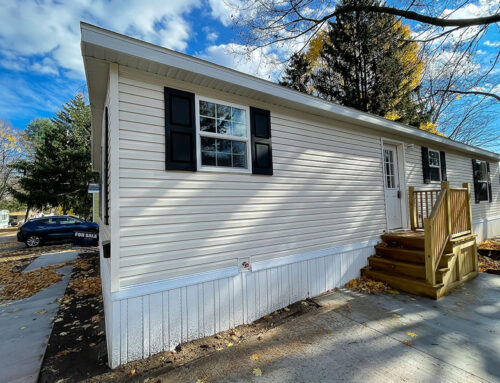I met Tony at a recent networking event for new investors where I was asked to give a talk on the best places to buy investment property in New Jersey. I talked about a few places that I think hold a lot of potential, like Weehawken and Bayonne, but made sure to point out that, as long as you have a way to generate leads on distressed properties, finding deals just about anywhere shouldn’t be a problem.
Afterward, Tony was one of the few investors who took the time to approach me to ask about generating these leads. Specifically, he wanted to know how to buy foreclosed homes in NJ since he’d read that we still have one of the highest foreclosure rates in the country. I told him about some of the New Jersey auctions and, since he took the time to ask for more information, I also cautioned him about what it takes to buy from them.
Understanding How to Buy Foreclosed Homes in NJ
Tony’s interest in buying foreclosed properties is not surprising. According to ATTOM Data Solutions, New Jersey had the fifth-highest foreclosure rates in the country last year. Overall, nationwide foreclosures are up 23% from a year ago, due in part to the expiration of COVID-19 foreclosure moratoriums. Pre-pandemic, there was a surprising rise in non-legacy foreclosures, but over the past year the bulk of foreclosure filings were on loans that originated prior to 2009. Presently, New Jersey is a seller’s market, with historically low interest rates and low inventory contributing to a rise in home prices. That means it may be more expensive to invest in a foreclosed property in NJ, but the potential ROI from flipping the home could also be much higher.
But, obtaining a foreclosed home in New Jersey isn’t without its challenges. The first thing to consider is that New Jersey is a judicial foreclosure state, which means the mortgage holder must file a lawsuit against the homeowner in the county where the property is located in order to foreclose. If the owner doesn’t contest the filing, the lender—in the vast majority of cases—will request that the court authorize the auction of the property in an effort to satisfy all, or part, of the remaining debt. Once the auction is approved, the home is scheduled to be sold by the county sheriff’s office to the highest bidder. This process, however, creates a long foreclosure timeline in New Jersey—more than three years on average. So, it can take a while for a property in default to actually become a foreclosed home that’s available for sale.
Secondly, though the homeowner, technically, loses their right to the home once the court grants the sale, they are still left with a few options to redeem the property. If they file for Chapter 11 or 13 bankruptcy before the sale date, for example, they are given the opportunity to participate in a repayment plan of 36 to 60 months. And, they may request up to two adjournments to delay the sale, get their paperwork in order, and arrange these payments. But, even after the sale, homeowners have up to 10 days to pay their debt in full and remain in possession of the house. However unlikely this outcome is, it’s still an important consideration to keep in mind when buying foreclosed homes. You could waste quite a bit of time following a property through the foreclosure pipeline, preparing for the sale itself, and, possibly, even winning the bid at an auction, only to have the house revert back to the original homeowner.
Buying Foreclosed Homes in New Jersey via Auction
That brings me to the auction process itself, which is difficult—and risky—to navigate on its own. All of the sheriff’s sales in New Jersey—whether they’re held in Mercer, Atlantic, or Monmouth counties—have strict terms of sales with fairly harsh consequences if those terms aren’t followed. Deposits of 20%, to be paid by cash or a cash equivalent, like a cashier’s check, certified check, or treasurer’s check, must be paid the day of the sale. Full payment is required within 30 days for most counties, though interest starts to accrue two or more weeks before the balance is due. So, unless you want to pay more than what you bid on the property, it’s critical that you pay it off as soon as possible. If you fail to pay at all, you will likely lose your deposit, inherit any expenses associated with re-auctioning the property, and have to pay the difference if the home sells for less during another sale. You should check online for the terms of sale in your county for any slight variations, but you can count on them rarely being easy and never being negotiable.
Unfortunately, even if you abide by all the rules as the winning bidder, the property doesn’t automatically become yours. Court approval is required on the sale of auction homes in NJ, which is typical for judicial foreclosure states. But, that doesn’t mean approval is guaranteed. So, there is always the chance that your attempts to do everything right simply won’t pay off. There’s also the possibility that the homeowner will attempt to redeem the property even after they’re not really legally allowed to try anymore.
The Issue with Foreclosure Auctions
In Monmouth County, for example, if a homeowner decides to file for Chapter 11 or 13 bankruptcy after the sale, but before you’ve been issued the deed, your ability to take possession grinds to a halt. Your deposit won’t be returned either until the Sheriff receives instructions from the court on how to proceed. Not only can these potential delays throw a wrench into your plans to renovate and sell your investment property during the warmer seasons, but with your cash deposit held hostage you could be prevented from putting money down on another investment opportunity that pops up in the meantime.
If or when the property does become yours, you may find you don’t even want it and wish you hadn’t bought it. Foreclosed homes that are sold at auctions run the gamut from minor to major fixers, but you won’t necessarily know which one you’re bidding on ahead of time since home inspections are rarely allowed. In many cases, if a homeowner has been unable to meet their mortgage payments, they’ve also been unable to care for the home. So, you can count on some degree of work being required to substantially improve the property’s condition.
If you add to that any additional neglect and damage that might have occurred while the house stood empty, you could stand to lose a lot more to the rehab than you’ve budgeted for. If the house isn’t empty, you’ll also have to handle the eviction, whether it’s of the owner, renters, or squatters, and pay to remediate any other encumbrances, like back taxes and liens, that are attached to the property too. In the end, the money you shell out for one of these properties could be substantial, despite how little you may have paid for it to begin with.
Personally, I think it’s easier and much less of a risk to buy homes directly from distressed homeowners. If you can reach them when they might be struggling to make their loan payments, but before they’re foreclosed on, you have a good lead on your hands. The homeowners may want to sell before their bad situation gets worse. You’ll also get access to the home to determine how much work needs to be done so that you can make an accurate and fair offer. And, you’ll get to close on a date that works for you and the homeowner, instead of waiting for months on a court approval that may never come. But first, you need a way to find these motivated sellers.
Find Motivated Sellers and Lose the Auctions
I told Tony that I once bought a foreclosed property from an auction and I got pretty lucky in terms of its condition and how much I paid for it. But, because court approval came months after I bid, I was knee-deep in another renovation by then and had to put the auction property on the back burner. Rehabbing and reselling it later than I wanted caused me to take a small hit on my return. Even then, I felt lucky. I’ve known investors who’ve lost a lot more than me on foreclosed homes.
After that experience, I looked for another way to find better leads on distressed homes. I found it by becoming an independently owned and operated HomeVestors® franchisee. Thanks to HomeVestors® widely-recognized We Buy Ugly Houses® ad campaign, distressed homeowners know who to call when they need help. It’s a campaign that’s so effective, in fact, that over 140,000 houses have been bought by franchisees like me across 47 states and D.C. since 1996. So, there’s no need to attend a foreclosure auction to find a good deal, just as there’s no need for a homeowner in an “ugly” financial situation to lose their home to a lender.
Lend a hand to a distressed homeowner by buying their home before it goes to auction. Contact HomeVestors® to get access to motivated sellers who will reach out to you today!
Each franchise office is independently owned and operated.
Contact
"*" indicates required fields





